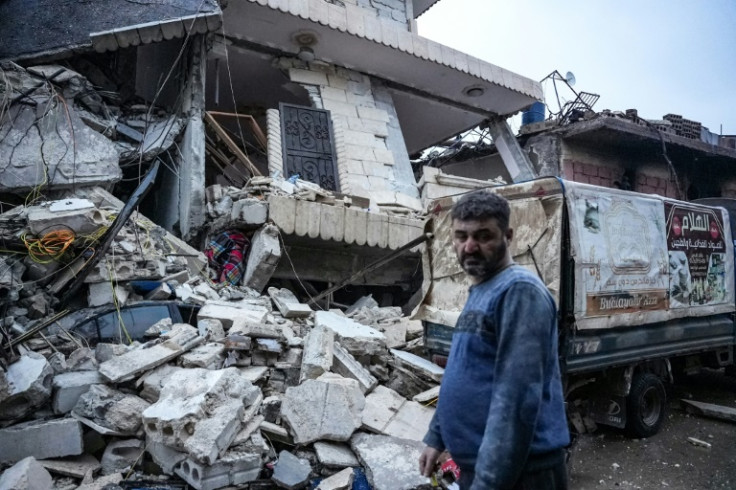
Flights intended for the purpose of earthquake relief have been utilized by Iran to deliver weaponry and military equipment to its strategic ally Syria, according to nine Syrian, Iranian, Israeli, and Western sources.
According to the sources, hundreds of flights carrying goods from Iran started landing at Syria's Aleppo, Damascus, and Latakia airports after the earthquake that struck northern Syria and Turkey on Feb. 6. This supply flow continued for seven weeks. According to the United Nations, Syria as a whole saw more than 6,000 fatalities.
The objective was to bolster Iran's defenses against Israel in Syria and to support Syrian President Bashar al-Assad, claimed sources. This development was first reported by Reuters.
The supplies included advanced communications equipment and radar batteries and spare parts required for a planned upgrade of Syria's Iran-provided air defense system in its civil war, two regional sources, and a Western intelligence source said.
For this article, Reuters consulted Western intelligence officials, sources close to the Iranian and Israeli governments, a Syrian military defector, and an active-duty Syrian officer.
Iran's mission to the United Nations in New York responded, "That's not true," when questioned about whether Iran had used humanitarian relief flights after the earthquakes to transport military material to Syria to strengthen its network there and support Assad.
A request for comment was not answered by the government of Syria.
According to regional sources cited by Reuters, Israel launched an aggressive counterattack after learning promptly about the movement of weapons into Syria.
Israeli air strikes against the shipments relied on intelligence so precise that Israel's military knew which truck in a long convoy to target, according to Brigadier General Yossi Kuperwasser, an insider and former head of research in the Israel army as well as the general director of the Ministry of Strategic Affairs.
An Israeli defense official, who asked to remain anonymous, told Reuters, "Under the guise of shipments of earthquake aid to Syria, Israel has seen significant movements of military equipment from Iran, mainly transported in parts."
He claimed that the Aleppo airport in northern Syria received the majority of the aid. Shipments were organized, he said, by the Unit 18000 Syrian division of the Quds Force, the foreign espionage and paramilitary arm of Iran's Revolutionary Guards, led by Hassan Mehdoui.
Ground transportation was handled by the Quds Force's Transport Unit 190 led by Bahanem Shahariri, he said. Reuters was unable to reach Mehdoui and Shahariri for comment. The Revolutionary Guards declined to comment.
"Israel's strikes also targeted a meeting of commanders of Iranian militias and shipments of electronic chips to upgrade weapons systems," said Syrian military defector Colonel Abduljabbar Akaidi, who retains army contacts. Akaidi did not say where the meeting was held.
According to a regional source, Israel struck Aleppo's runway just hours after two Iranian cargo planes had arrived with arms shipments while pretending to be carrying aid supplies. This information was corroborated by two additional Western intelligence sources.
Brigadier General Esmail Qaani, head of the Revolutionary Guards' Quds Force, was the first foreign official to set foot in Syria's quake zone, a few days before Assad himself arrived. Reuters could not reach Qaani for comment. The Revolutionary Guards declined to comment.
In the event of a humanitarian crisis, UN relief aircraft are permitted to ask local authorities for permission to land, and humanitarian goods are free from penalties. In this instance, direct planes from Iran and Russia have been given permission to land in Syria by the authorities.
"The quake was a sad disaster but at the same time, it was God's help to us to help our brothers in Syria in their fight against their enemies. Loads of weapons were sent to Syria immediately," said a regional source close to Iran's clerical leadership.
Israel has for years carried out attacks against what it has described as Iran-linked targets in Syria, where Tehran's influence has grown since it began supporting Assad in the civil war that began in 2011.
Israeli efforts to destroy Iran in Syria are picking up, according to a Syrian army official who asked to remain anonymous.
Following additional earthquakes on Apr. 3, Israeli targets have included weapons warehouses in the Jabal Manea Kiswa mountain range south of Damascus, where Iranian troops and Lebanon's Hezbollah have built what is likely their most heavily fortified military site in Syria, according to two Western intelligence sources and a regional security source.
A radar station used for drones was also hit on Apr. 3, the regional source added, corroborating what two Western intelligence sources had told Reuters.
© 2025 Latin Times. All rights reserved. Do not reproduce without permission.




